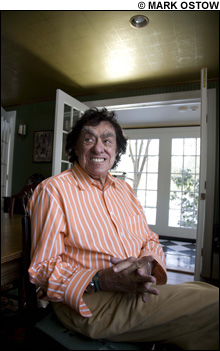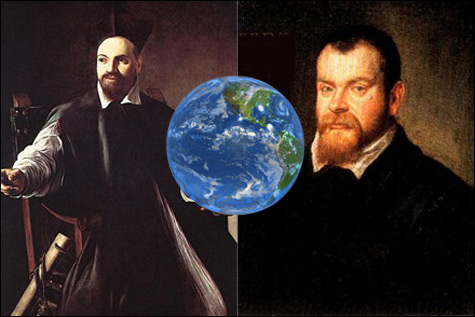
SUN KING: Richard Goodwin has crafted a play that revolves around the sun and the Earth. |
Real-life quantum leaper Richard Goodwin was sort of a 1960s political Zelig — everywhere you looked, there he was. A speechwriter and advisor for presidents John F. Kennedy and Lyndon B. Johnson, Goodwin also helped lead the congressional investigation of the Twenty One scandal (which, decades later, inspired the film Quiz Show — the Rob Morrow character was based on Goodwin); coined Johnson's infamous social-reform initiative "The Great Society"; was present when Robert F. Kennedy was assassinated; and briefly escorted, plus maintained a life-long friendship with, Jacqueline Kennedy Onassis.As a writer, he has tried on many hats, as well, from penning speeches in the West Wing, to writing articles for Rolling Stone and the New Yorker, to authoring books that dissect the American social and political landscape, including Remembering America: A Voice From the Sixties (1988) and Promises to Keep: A Call for a New American Revolution (1992). These days, the Renaissance man of American history is immersing himself in 16th- and 17th-century historical fiction, as his play, Two Men of Florence, makes its American debut at the Huntington Theatre this Friday (March 6).
Two Men of Florence recounts the titanic clash of Galileo Galilei — the physicist and astronomer who championed heliocentrism, despite the popular (and completely ass-backward) Bible-thumper belief that the sun revolved around the Earth — and Galileo's former mentor Cardinal Maffeo Barberini, who later became Pope Urban VIII. Their clashing ideologies were further complicated by Galileo's own devout Catholicism. Galileo nonetheless held fast to his belief that the Earth revolved around the sun, even after he was tried for heresy (a crime sometimes punished by death during the Roman Inquisition period) and sentenced to house arrest. He died in his home after nearly 10 years of confinement.

"In many ways, what the play is about, intellectually, is a clash between reason and faith — between scientific reason and belief," says Goodwin, from his perch in a sauna-like office in the Huntington rehearsal space, two weeks before opening night. "When I first ran across this story, of Galileo and Pope Urban VIII, it just struck me that it was a natural drama. It has the two greatest egos of the 17th century — and moral conflict."
Waiting for the planets to align
Originally published in 1998 and entitled The Hinge of the World, the play made its theatrical debut in 2003, in Guildford, England, at the small and eclectic Yvonne Arnaud Theatre. It was directed by Edward Hall (who is also directing the Huntington production), and was well received. But it stalled in its tracks when both Hall and Goodwin expressed reluctance to re-cast the show for a flashier run.
"The West End [London's Broadway equivalent] was willing to do the play," says Goodwin's wife, famed historian and Pulitzer Prize–winner Doris Kearns Goodwin (whose most recent book, Team of Rivals: The Political Genius of Abraham Lincoln, is on President Barack Obama's essential Oval Office reading list). "But Edward was so loyal to the actors who were in the original production, who were Shakespearean actors, and it would have [needed] some stars to go to the West End. [I]t's just the economics of what the West End demands — to have 'name' stars."
The American debut was delayed further while the Goodwins — who take more than a passing interest in each other's projects — waited for planets (and schedules) to align. "[Then] Dick got involved with writing the last part of the Lincoln book with me," notes Doris.
"And then," adds Brookline-native Goodwin with absolute sincerity, "we had to wait for the Red Sox to win the World Series."
One reversed curse (and a second, somewhat anti-climactic, World Series championship) later, the play made it across the pond to Goodwin's home base, having undergone a title change, some major character developments, and, as is generally the case in theater, ongoing dialogue tweaks that will likely continue until the very last minute.
"I think [my background in] speechwriting helped," says Goodwin. "Speech is dialogue. It may seem like just an individual talking, but you have to consider the impact on the audience, and what people think. The worst thing about speeches, though, is you can't tell the president what to say if he doesn't want to say it. On the other hand, when you write a play, you can make them say anything you want. . . . It's a little easier in some ways than writing for politicians, or for presidents, especially, because the characters you write about can't tell you they won't say [your lines]. While presidents do do that."

PAPAL JAM: Pope Urban VIII (left) and Galileo Galilei’s clash over the Earth’s orbit around the sun resonates today with the battle between creationism an science. |
Continuing warfare
"Richard is not like a first-time playwright," says Goodwin's director, Hall. "He's spent his life trying to figure out how to communicate ideas. He's spent his life writing for theater, really. He has a unique ability to see the opposite truth in every statement, and if you are to create anything worthy of debate, you have to have that talent."